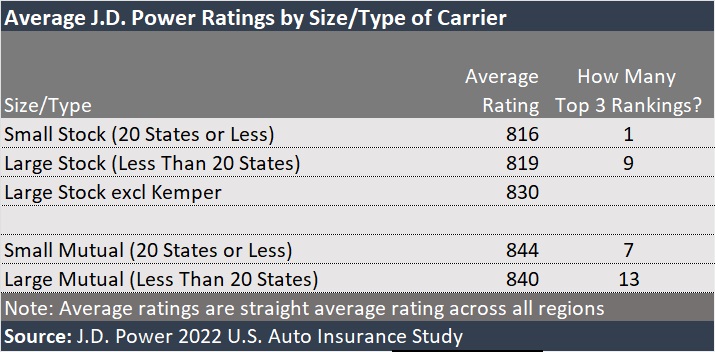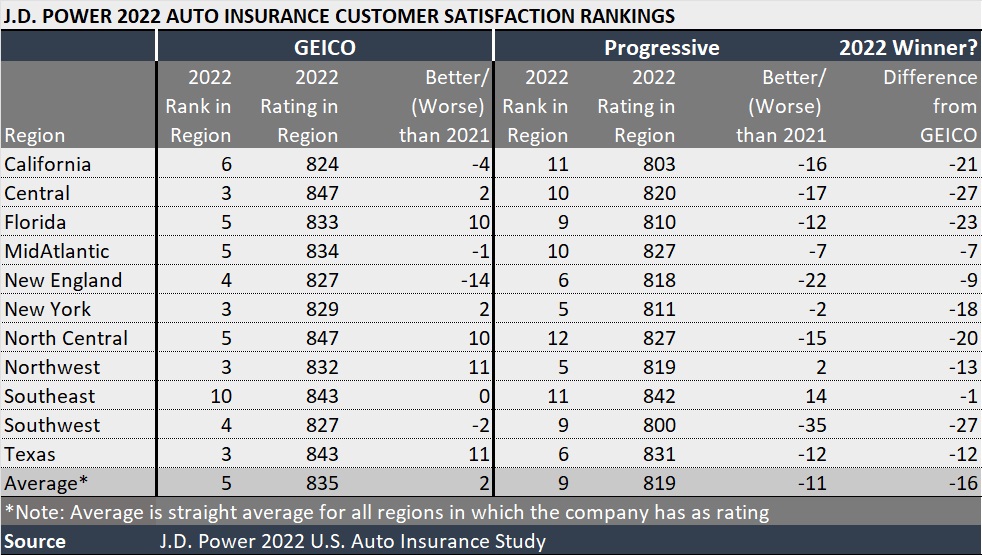

When Warren Buffett told Berkshire Hathaway investors that State Farm continues to dominate the large auto insurance carrier landscape during this year’s annual meeting, he was referring to scale rather than customer satisfaction scores.
But State Farm wins on that front too, according to a Carrier Management analysis of customer satisfaction rankings published by J.D. Power last month in the J.D. Power 2022 U.S. Auto Insurance Study.
The J.D. Power study provides satisfaction ratings for individual carriers in 11 regions of the country—with anywhere from seven to 13 carriers listed for each region. Satisfaction is measured on a 1,000-point scale, with an average rating of 834 measured for the industry overall, according to J.D. Power.
State Farm’s customer satisfaction scores outpaced GEICO’s in 9 of the 11 regions. For State Farm, the average across the 11 regions is 842, seven points higher than GEICO’s average of 835. (The 842 and 835 ratings were calculated by Carrier Management as the simple straight average of the 11 regional scores.)
State Farm’s regional customer satisfaction scores ranked among the top three carriers in seven of the 11 regions studied, with one first-place ranking (in the Southwest), four second-place spots and two third-place finishes. GEICO’s scores came in the top three in just four of the 11 regions, and the highest finish for Berkshire’s personal auto insurer in any region was a third-place ranking.
But the competition is closer in 2022 than it was in 2021, with GEICO garnering better J.D. Power customer satisfaction scores in Florida, New York and the Northwest and North Central regions in 2022 than 2021, where State Farm’s satisfaction scores worsened.
Are Mutuals Just Better?
During the Berkshire annual meeting, Buffett suggested that State Farm’s ownership structure as a mutual insurer rather than a stock company had something to do with its dominance in terms of growth and overall size. An analysis of J.D. Power customer satisfaction ratings along those lines seems to bear that out, with mutuals generally overshadowing stock insurers.
Below, J.D. Power customer satisfaction ratings for 16 mutual insurers that operate in 20 states or fewer are listed. (Note: For many of these carriers, J.D. Power only published customer satisfaction scores in a single region.)
The individual satisfaction scores for these sixteen small mutuals average about 844, roughly on par with larger mutuals (including State Farm), which came in at 840. The small mutuals also achieved top-three rankings in seven regions, putting top-three rankings for all mutuals included in the J.D. Power study (large and small) at 20.
On the stock company side, size seems to matter more—with larger stock companies achieving the higher average satisfaction ratings and more top-three regional rankings.

Excluded from the tally above are reciprocals Erie Insurance, Farmers and USAA. As in past years, J.D. Power does not include USAA’s off-the-charts satisfaction scores in its regional rankings. In the past reports, J.D. Power has explained that USAA is not ranked due to the closed nature of its membership.
Flatline Headline: Pricing and Telematics
When J.D. Power announced the release of the J.D. Power 2022 U.S. Auto Insurance Study in mid-June, the focus was not on stock vs. mutual or big vs. small. Instead, the headline of the media statement was “Usage-Based Auto Insurance Takes Center Stage as Satisfaction Flatlines.”
The flatlining description refers to the fact that overall customer satisfaction with auto insurance providers is 834 in 2022, almost a replay of 835 a year ago. Region by region, results for both years were similar as well. Below, we display the region average from the J.D. Power 2022 and 2021 report as well as the 2016 report, illustrating that the big jump in satisfaction over 2016 stalled in 2022.
The J.D. Power announcement suggests that higher auto insurance prices are part of the reason that customer satisfaction stopped moving up last year. According to J.D. Power, customer satisfaction with the price of their policies is 769 for 2022, down a significant 5 points from 2021.
“The current situation is a tough one for auto insurers, but it is not impossible in the current inflationary environment to build customer satisfaction and retention,” said Robert Lajdziak, director of insurance intelligence at J.D. Power, in a media statement. “J.D. Power finds two bright spots in the data for insurers. First, those insurers that are transparent and notify customers in advance of price increases can blunt the negative effects of a price increase. Second, usage-based insurance is growing quickly, with an all-time high number of customers adopting these programs and due to their experience using them, overall customer satisfaction levels have significantly risen.”
Specifically, J.D. Power found:
Back to Buffett—and Prices
 In addition to talking about State Farm during several annual meetings for Berkshire Hathaway, Buffett and Vice Chair Ajit Jain routinely compare Berkshire’s auto insurer with Progressive—noting that Progressive is way out in front of GEICO on rolling out usage-based insurance policies based on telematics technology and highlighting Progressive’s superior ability to match rate to risk.
In addition to talking about State Farm during several annual meetings for Berkshire Hathaway, Buffett and Vice Chair Ajit Jain routinely compare Berkshire’s auto insurer with Progressive—noting that Progressive is way out in front of GEICO on rolling out usage-based insurance policies based on telematics technology and highlighting Progressive’s superior ability to match rate to risk.
Meanwhile, Progressive and another telematics leader—Allstate—have been telling their investors about aggressive moves they’re making to raise insurance prices in response to inflation trends. (Related articles, “Why You May See Less of Progressive’s Flo In Your State” and “Rate Hikes, Telematics, Data Science Leading Allstate Back to Profit” and “Telematics Has Kept It’s Promise: Allstate’s Journey Continues“)
Relative customers satisfaction scores suggest that price may be weighing Progressive’s scores down more than delight with telematics is picking them up. Progressive’s 2022 customer satisfaction scores are lower than GEICO’s in every region included in the J.D. Power report. In addition, Progressive’s scores are down anywhere from 7 to 35 points from 2021 in all but one region. For the only region in which the score increased this year—the Northwest—the jump was only 2 points.
 Among large stock insurers, Progressive posted the second-lowest average score customer satisfaction score across all regions (calculated as the straight average of 11 regional scores by Carrier Management). Only Kemper has a lower score—the lowest score recorded in the report—748 in the state of California.
Among large stock insurers, Progressive posted the second-lowest average score customer satisfaction score across all regions (calculated as the straight average of 11 regional scores by Carrier Management). Only Kemper has a lower score—the lowest score recorded in the report—748 in the state of California.
Allstate, in spite of its push to increase rates in late 2021 and 2022 so far, recorded some of the highest customer satisfaction scores among large stock insurers. Allstate’s 2022 satisfaction scores were higher than 2021 scores in five regions and lower in six regions. In regions where satisfaction scores increased in 2022, Allstate’s scores were also higher than Progressive’s scores.
Region by Region
Although Allstate saws its regional customer satisfaction score rise in California, a review of the bigger picture of regional averages set forth in the J.D. Power report reveals that auto insurance carriers generally had to work hardest to please customers in California and New York.
Ratings vary widely by region, with drivers in California scoring carriers 29 points lower, on average, than car owners in the Southeast—the area with the most satisfied auto insurance customers.
Still, even though the regional average rating for California is a 820, Wawanesa garnered a score of 879 there—the highest score for any carrier in any region in the study. Ranked No. 1 among 13 carriers whose ratings are listed by J.D. Power for California, Wawanesa’s score is a 131 points above the lowest-ranked carrier (Kemper)—making the spread of ratings from best to worst the largest range of scores in any region studied.
The spread of ratings is tightest in New York—the home of the next most dissatisfied group of customers—where New York Central Mutual’s 834 rating outpaces the average for seven insurers writing in New York by 12 points and the worst score (for Liberty Mutual) by 36 points.
In the region with the most satisfied customers—the Southeast—the regional average for 16 carriers came in at 849, with Farm Bureau Insurance-Tennessee, Auto-Owners Insurance and Erie Insurance leading the pack.